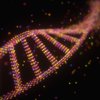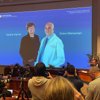Fritextsökning
Artiklar per år
Innehållstyper
-

Första godkännandet för behandling byggd på gensaxen Crispr
För första gången har en behandling som bygger på den Nobelprisvinnande genredigeringstekniken Crispr fått ett marknadsgodkännande. Det är brittiska myndigheter som ger grönt ljus för Casgevy, en behandling mot sickelcellssjukdom och beta-thalassemi.
-

Life science-profil utnämnd till ”årets vd”
När den europeiska lifescience-industrin samlades gick utnämningen "årets vd" till svenska Gunilla Osswald.
-

Novo Nordisk to invest billions in Danish manufacturing facilities
Danish pharmaceutical giant Novo Nordisk is investing DKK 42 billion, equivalent to around SEK 65 billion/EUR 5.6 billion, in its manufacturing facilities in Kalundborg, Denmark.
-

The Swedish Academy of Sciences: “We have too many researchers”
Sweden does not need more researchers, but it does need better ones. According to the Royal Swedish Academy of Sciences, funding should be distributed to favour excellence.
-

High biological age is linked to a higher risk of dementia and stroke
It is a well-known fact that people age at different rates, and a recent study at the Karolinska Institute suggests that people with a biological age higher than their actual age are significantly more likely to suffer from dementia and stroke.
-

Tirzepatide approved for obesity by the FDA – to be branded as Zepbound
Diabetes drug tirzepatide has now also been approved in the US for treating obesity.
-

Bygger ett ekosystem för ATMP
Avancerade terapiläkemedel var på agendan vid det vetenskapliga mötet Bioscience i Stockholm under onsdagen. Anna Falk, professor vid Lunds universitet, som talade på eventet, leder ett centrum i Lund fokuserad på accelerationen av utvecklingen av denna typ av läkemedel.
-

Hög biologisk ålder kopplas till ökad risk för demens och stroke
Människor åldras i olika takt, som bekant. Nu indikerar en studie vid Karolinska institutet att personer med högre biologisk ålder än deras faktiska ålder löper signifikant större risk att drabbas av åkommor som demens och blodpropp i hjärnan.
-

Founder of Bioarctic, Lars Lannfelt, is honoured: “I want to create something for the future”
It´s like a scientist’s dream: to be the world’s first with a drug that genuinely affects one of our major diseases. Lars Lannfelt and his company Bioarctic have achieved just that, and they are thus making a significant contribution to the history of Swedish medicine. He is now being awarded the Research!Sweden Award 2023.
-

“A major energy boost for the entire cancer vaccine field”
The development of cancer vaccines has accelerated in recent years. Norwegian Ultimovacs is one of the companies attempting to develop a new type of treatment line for cancer patients, and the company recently presented positive data from a phase II
-

Bioarctics grundare Lars Lannfelt prisas: ”Vill skapa något för framtiden”
Det låter som en forskares dröm: att bli först i världen med ett läkemedel som har verklig effekt mot en av våra stora folksjukdomar. Lars Lannfelt och hans företag Bioarctic har uppnått just det, och ligger därmed bakom en verklig bedrift i svensk medicinhistoria. Nu tilldelas han Forska!Sveriges utmärkelse 2023.
-

Ny modell ska hitta barn i riskzonen för allvarlig RSV-infektion
Forskare i Sverige och Finland har tagit fram en modell för att identifiera de barn som löper störst risk att drabbas av en allvarlig infektion av RS-virus.
-

Han tilldelas Lilla Polhemspriset 2023 för studier på bananflugor
Lilla Polhemspriset, som årligen delas ut av fackförbundet Sveriges Ingenjörer till landets bästa examensarbete på civilingenjörsutbildningen, går i år till Jonathan Södergren. Han har med hjälp av bananflugor närmare undersökt möjliga metoder att studera Alzheimers sjukdom på.
-

High-tech companies are increasingly focusing on health
Tech companies have been taking an interest in healthcare for many years, and this interest seems to be increasing. “It’s not a sudden shift in trend, it’s more about them advancing their positions,” says Anna Lefevre Skjöldebrand, CEO of Swedish Medtech.
-

Study: Cancer vaccine prolongs survival in difficult-to-treat tumour disease
According to a new study, a combination of a cancer vaccine from Norwegian company Ultimovacs and two immunotherapies significantly prolonged survival in cases of the aggressive cancer mesothelioma.
-

“You discover one thing – and then 10 new questions arise”
COVID-19, diabetes, heart disease, and the impact of dog ownership on humans are just some of multitasker Tove Fall’s areas of research. However, her current focus is on her next field: the role of gut flora in human health.
-

Novo Nordisk buys drug candidate in billion dollar deal
The Danish pharmaceutical giant Novo Nordisk have made an agreement with KBP Biosciences to aqcuire the hypertension drug ocedurenone for up to 1.3 billion dollars, which corresponds to approximately 14 billion Swedish kronor.
-

Innovativ cellodling lockar investerare till Lundabolag
Lundabolaget Cellevate har säkrat ett finansiellt tillskott på 39 miljoner kronor, som ska bidra till att skynda på kommersialisering och global lansering av företagets cellodlingssystem.
-

The physician at the tech giant: “Observations in the emergency room made my mind up”
When Nasim Farrokhnia was in third grade at school in Tehran, the capital of Iran, her father gave her a book about Marie Curie, which soon became her favourite book. Perhaps her interest in science was born there and then, as science and new technology
-

Study names with an attitude – more important than you might think
Ironman, T-rex, Star-Trek. Popcorn, Proper, Scout. Nope, these are neither fantasy films nor dog names. They’re the names of ongoing cancer studies in Sweden.
-

Rickard Sandberg on this year’s Nobel Prize in Medicine: ”A key discovery”
The discovery that paved the way for the development of todays mRNA vaccines is the basis for this year’s Nobel Prize in Physiology or Medicine.
-

Medicinpriset till forskare bakom mRNA och första covidvaccinen
Årets Nobelpris i fysiologi eller medicin går till förhandstippade Katalin Karikó och Drew Weissman från University of Pennsylvania.
-

The first drugs to slow down Alzheimer’s – but what does it mean for patients?
New treatments for early Alzheimer’s are bringing hope to thousands of patients and their families. The question is, who will get the treatment, how will the right patients be found in time, and will the healthcare system’s resources be sufficient? Life
-

Marie Gårdmark: ”The situation is not satisfactory”
”The legislative tool-box is limited, but carrots in the form of longer exclusivity has already proven successful, this has for example increased registration of new products in rare diseases. But will it also work to increase access for all EU patients